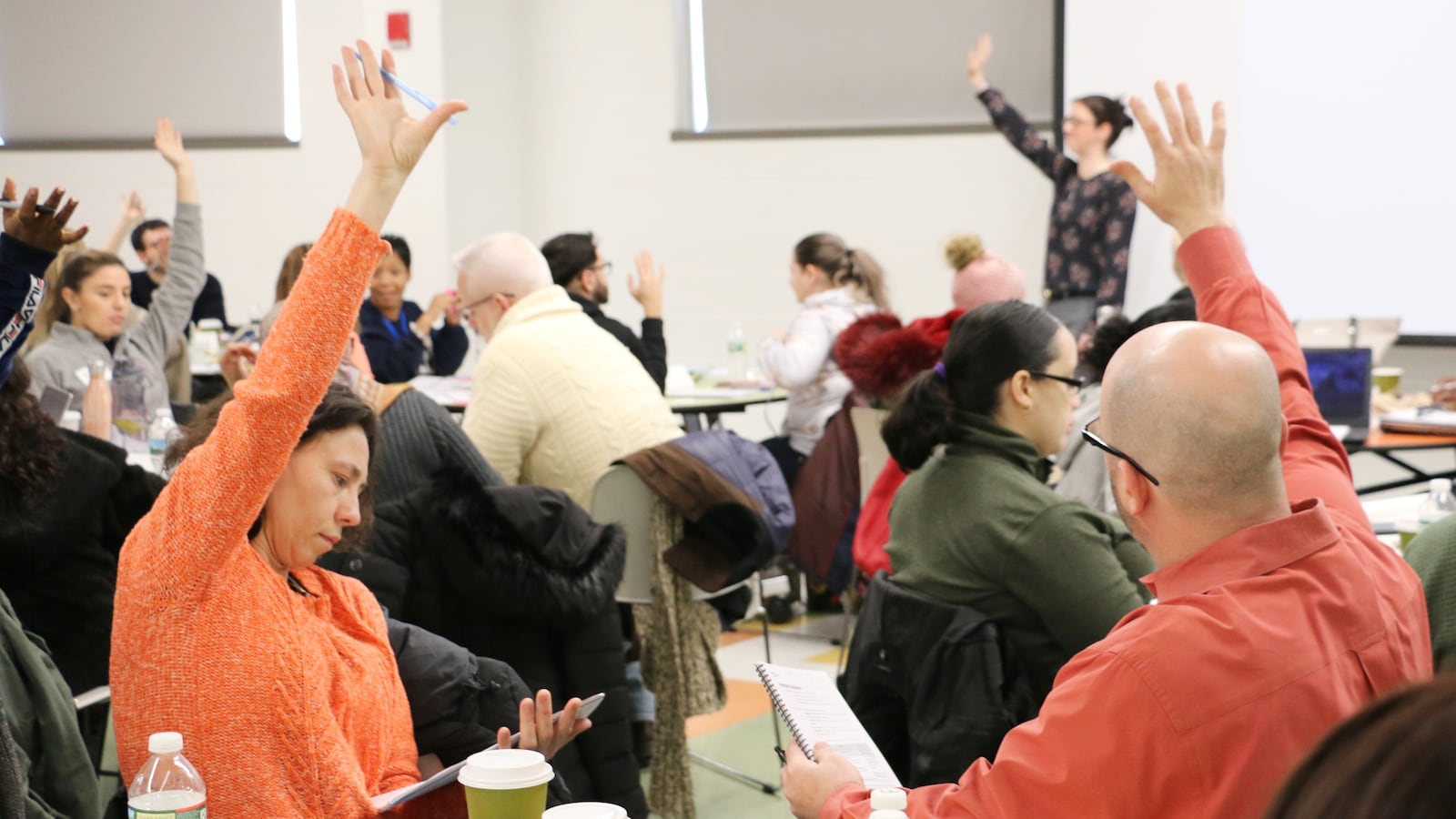Dozens of Newark Public Schools teachers got a crash course in reading instruction Wednesday that, on the surface, looked like a typical training.
Seated around tables in the Elliott Street School cafeteria in Newark’s North Ward, the educators underlined key lines in a piece of academic writing — a critical skill for students trying to make sense of a complicated reading. They learned how to gauge the difficulty of a text, which they practiced on a passage from an Edgar Allan Poe story. And they watched a video of a teacher “aggressively monitoring” her students’ reading by asking probing questions and recording their answers.
But this workshop came with a twist: The instructors, materials, and videos were provided by Uncommon Schools, a network of charter schools — schools that are often viewed as district rivals, not partners.
“Personally, I don’t care where it comes from if it works,” said Erica Paich, a literacy specialist in the North Ward assistant superintendent’s office. “For me, it’s about the instructional strategies and best practices to support our students.”
One justification for charter schools, which are publicly funded but privately operated, is that they can function as incubators of innovative practices that can later be shared with traditional schools. But, in practice, such cross-sector pollination is rare — especially in cities like Newark, where district and charter schools compete for students and funding, and critics accuse charters of serving less than their fair share of the neediest students.
Uncommon, which operates several high-performing Newark schools under the banner of North Star Academy, is one of the few examples of a charter organization sharing its strategies with district schools — a partnership that began under Christopher Cerf, the district’s previous, charter-friendly superintendent. Some observers expected Cerf’s successor, Roger León, a Newark Public Schools veteran, to take a tougher stance on charters.
Instead, León has repeatedly signaled his openness to working with the charter sector, which now enrolls more than a third of Newark students. On Wednesday, León said he plans to borrow some effective practices from charter schools as he tries to strengthen and standardize teaching across the district.
“We want to be in conversations with partners who are doing things we’re not doing,” León said during a brief visit to the Uncommon workshop Wednesday, which was a training day for all district teachers. “They get credit for saying they helped us — and we get credit for doing a strategy that worked.”
The district began importing some of Uncommon’s methods after then-Superintendent Cerf visited one of its Newark schools in 2016. After watching how the charter teachers taught reading, Cerf told an aide, “I want to bottle this,” according to an account in the The 74. That led to several Uncommon-led trainings of district staffers, and to a district-run summer program for struggling readers that employed Uncommon’s teaching techniques.
In May, the charter network led a workshop for Newark Public Schools principals on how to coach beginning teachers. To the delight of Uncommon officials, León — who had been selected as superintendent that week — made a brief appearance.
Uncommon has also supported district schools in New York City, using a state grant. (The network covered the cost of Wednesday’s training with private funds; the district was not charged.) Uncommon, which was formed in 2005 and operates schools in six cities, also sells books and training materials that explain its approach.
“Sharing and disseminating our work has just been part of Uncommon’s DNA since we were founded,” said Crystal McQueen-Taylor, the network’s senior director of external impact.
León has partnered with other charter networks, too. In July, he sent some guidance counselors to a three-day training in Texas led by KIPP charter schools. More significantly — and to the dismay of some school board members — he has preserved a single application system for traditional and charter schools, making it easy for families to opt out of the district if they choose.
León’s friendliness toward charter schools may be tested this spring when he creates his first budget. Last school year, about a quarter of the district’s funding went to charter schools.
Many district teachers are quick to point out the disparities between the two sectors — how some charter schools occupy brand-new buildings while theirs are crumbling, or how charters on average enroll fewer students with disabilities or those still learning English than traditional schools. However, some teachers say they prefer to focus less on those divisions than on the sectors’ shared goals.
“We’re all on the same team,” said Isabel Abreu, a fourth-grade teacher at Benjamin Franklin School who attended Wednesday’s training. “We’re here for the education of children.”

